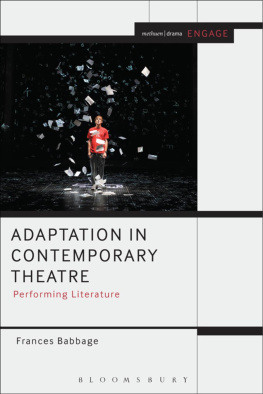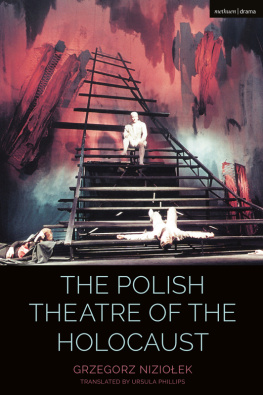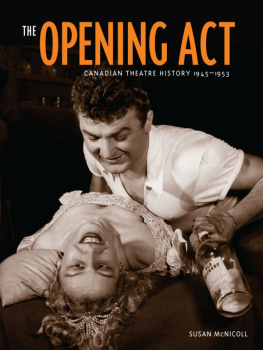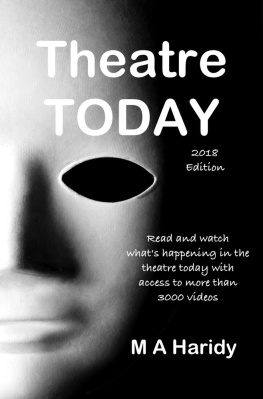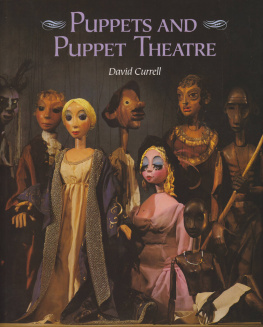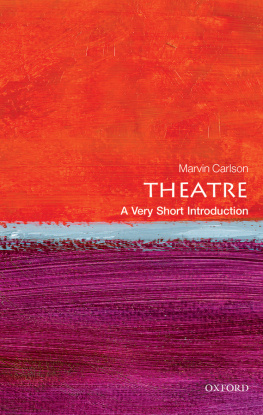MUSICALITY IN THEATRE
ASHGATE INTERDISCIPLINARY STUDIES IN OPERA
Series Editor
Roberta Montemorra Marvin
University of Iowa, USA
Advisory Board
Linda Hutcheon, University of Toronto, Canada
David Levin, University of Chicago, USA
Herbert Lindenberger, Emeritus Professor, Stanford University, USA
Julian Rushton, Emeritus Professor, University of Leeds, UK
The Ashgate Interdisciplinary Studies in Opera series provides a centralized and prominent forum for the presentation of cutting-edge scholarship that draws on numerous disciplinary approaches to a wide range of subjects associated with the creation, performance, and reception of opera (and related genres) in various historical and social contexts. There is great need for a broader approach to scholarship about opera. In recent years, the course of study has developed significantly, going beyond traditional musicological approaches to reflect new perspectives from literary criticism and comparative literature, cultural history, philosophy, art history, theatre history, gender studies, film studies, political science, philology, psycho-analysis, and medicine. The new brands of scholarship have allowed a more comprehensive interrogation of the complex nexus of means of artistic expression operative in opera, one that has meaningfully challenged prevalent historicist and formalist musical approaches. The Ashgate Interdisciplinary Studies in Opera series continues to move this important trend forward by including essay collections and monographs that reflect the ever-increasing interest in opera in non-musical contexts. Books in the series will be linked by their emphasis on the study of a single genreoperayet will be distinguished by their individualized and novel approaches by scholars from various disciplines/fields of inquiry. The remit of the series welcomes studies of seventeenth century to contemporary opera from all geographical locations, including non-Western topics.
Musicality in Theatre
Music as Model, Method and Metaphor in Theatre-Making
DAVID ROESNER
ASHGATE
David Roesner 2014
All rights reserved. No part of this publication may be reproduced, stored in a retrieval system or transmitted in any form or by any means, electronic, mechanical, photocopying, recording or otherwise without the prior permission of the publisher.
David Roesner has asserted his right under the Copyright, Designs and Patents Act, 1988, to be identified as the author of this work.
Published by
Ashgate Publishing Limited
Wey Court East
Union Road
Farnham
Surrey, GU9 7PT
England
Ashgate Publishing Company
110 Cherry Street
Suite 3-1
Burlington, VT 05401-3818
USA
www.ashgate.com
British Library Cataloguing in Publication Data
A catalogue record for this book is available from the British Library
The Library of Congress has cataloged the printed edition as follows:
Roesner, David.
Musicality in theatre: music as model, method and metaphor in theatre-making / by David Roesner.
pages cm. -- (Ashgate interdisciplinary studies in opera)
Includes bibliographical references and index.
ISBN 978-1-4094-6101-2 (hardcover: alk. paper) -- ISBN 978-1-4094-6102-9 (ebook) -- ISBN 978-1-4724-0731-3 (epub) 1. Music in the theater. 2. Theater -- Production and direction. I. Title.
MT960.R37 2014
782.1--dc23
2013051048
ISBN 9781472407313 (hbk)
ISBN 9781409461029 (ebk-PDF)
ISBN 9781472407313 (ebk-ePUB)
For Christina, Vincent and Laurenz
Contents
List of Figures
Series Editors Preface
Ashgate Interdisciplinary Studies in Opera provides a centralized and prominent forum for the presentation of cutting-edge scholarship that draws on numerous disciplinary approaches on a wide range of subjects associated with the creation, performance, dissemination, and reception of opera and related genres in various historical and social contexts. The series includes topics from the seventeenth century to the present and from all geographical locations, including non-Western traditions.
In recent years, the field of opera studies has not only come into its own but has developed significantly, going beyond traditional musicological approaches to reflect new perspectives from literary criticism and comparative literature, cultural history, philosophy, art history, theater history, gender studies, film studies, political science, philology, psychoanalysis, and even medicine. The new brands of scholarship have allowed a more comprehensive and intensive interrogation of the complex nexus of means of artistic expression operative in opera, one that has meaningfully challenged prevalent historicist and formalist musical approaches. Today, interdisciplinary, or as some prefer cross-disciplinary, opera studies are receiving increasingly widespread attention, and the ways in which scholars, practitioners, and the public think about the artform known as opera continue to change and expand. Ashgate Interdisciplinary Studies in Opera seeks to move this important trend forward by including essay collections and monographs that reflect the ever-increasing interest in opera in various contexts.
However, Musicality in Theatre: Music as Model, Method and Metaphor in Theatre-Making branches out beyond this conception of opera studies to deal with dramatic theater as a concept writ large. Opera is, of course, one of the manifestations of the concept, but the volume does not focus on opera as it is commonly recognized. Rather, the author more generally addresses musicality as an aesthetic dispositif through which to understand the processes of various genres of theatrical drama. The idea of opera is never far below the surface here; it remains a point of reference throughout the volume with the operatic underlying much of the discussion and serving as a model for investigating how the aural and the visual, as well as the theoretical and the practical, intersect. Challenging interdisciplinary boundaries, Roesner explores the fluid relationships between opera, musical theater, and theater tout court to demonstrate the ways in which music has continued to be influential in developments of theatrical forms. By tracing these relationships from the perspective of theater history in the modern and post-modern period, the author has produced a timely project that contributes new views and opens the way for further enquiry about music and the stage.
Roberta Montemorra Marvin
Acknowledgements
All books even if single-authored, are always also the result of constellations of collective creativity and support. Great thanks are therefore due to all those who formed the specific constellation for this book. An initial survey of my research topic through SCUDD the Standing Conference of Drama Departments UK provided very helpful responses and starting points. At the University of Exeter I was supported wonderfully by my drama colleagues, in particular Prof. Mick Mangan, Prof. Graham Ley, Dr Jane Milling and Dr Rebecca Loukes, and inspired by my students and PhD supervisees. My new drama department at the University of Kent provided a very welcoming and interested environment, which helped me to finish the book despite the normal turmoil of changing location.
While writing the book I was also able to share preliminary ideas in a range of encounters all of which have helped to question and refocus my thinking and have added interesting angles. In particular, these were workshops I gave at the University of Agder, Kristiansand; the Deutsches Theater Berlin; Exeter Performers Playground; Krber Studio Junge Regie, Hamburg; and conference papers at University of the Arts, Zurich; Birmingham Conservatoire; TAPRA 2012 at University of Kent; the Conference of the German Society for Theatre Studies 2012 at Bayreuth; and the colloquium of CNRS/ARIAS at the University of Montreal.
Next page

